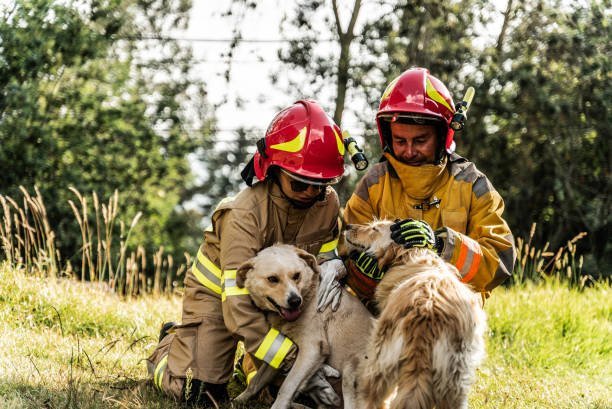What are the benefits of fostering a dog for a rescue organization?

Introduction:
In this article, we embark on a heartwarming exploration of the often-overlooked heroes in the world of dog rescue: foster caregivers. “In this article” we delve into the immense benefits of fostering a dog for a rescue organization. Fostering is a compassionate and selfless act where individuals open their hearts and homes to dogs in need, providing them with a safe haven while awaiting their forever homes.
By becoming a foster caregiver, you not only make a profound difference in the life of a dog but also contribute significantly to the mission of rescue organizations. Throughout this article, we’ll uncover the multifaceted advantages of fostering, from saving lives and offering rehabilitation to experiencing the joy of companionship and personal growth. Fostering truly exemplifies the transformative power of love and care, benefiting not only the dogs but also the compassionate individuals who take on this noble role.
Saving Lives and Easing Shelter Overcrowding
Fostering dogs for rescue organizations directly saves lives by providing temporary homes for dogs in need. Rescue organizations often operate at or near full capacity, and without foster homes, they may have to turn away dogs due to limited space. By fostering, you become a lifeline for dogs that might otherwise face uncertain fates in overcrowded shelters.
Additionally, fostering frees up space in shelters, allowing them to accommodate more dogs, particularly those in urgent or critical conditions. This collaborative effort helps alleviate the strain on shelters, ensuring that more dogs receive the care, attention, and opportunity to find forever homes.
Providing Temporary Homes and Comfort
Fostering offers dogs a loving and temporary home environment, providing comfort, security, and stability. Many dogs entering rescue organizations have experienced trauma, abandonment, or neglect, and the transition to a foster home can be a crucial step in their emotional healing process. In a home environment, dogs can decompress from the stress of shelter life and begin to rebuild trust and confidence.
Fosters play a pivotal role in providing the care, attention, and socialization that dogs need to thrive. They offer a safe space for dogs to relax, learn, and adapt to daily routines. This home-based care can be particularly beneficial for puppies, senior dogs, or those with special medical needs, as it allows for more personalized attention and tailored care plans.
Behavioral Rehabilitation and Socialization
Fostering offers a unique opportunity for behavioral rehabilitation and socialization. Dogs with behavioral challenges, whether due to past traumas or lack of socialization, can benefit greatly from the one-on-one attention and consistent training that a foster home provides.
Fosters can work on addressing issues like fear, anxiety, or reactivity, helping dogs become more well-adjusted and adaptable. They can also expose dogs to various environments, experiences, and social interactions, contributing to their overall development and increasing their chances of finding loving forever homes.
Moreover, the foster experience provides valuable behavioral insights to rescue organizations, allowing them to better match dogs with potential adopters based on their personalities and needs. In essence, fostering not only transforms individual dogs but also enhances their prospects for successful adoptions.
Personal Growth and Fulfillment for Fosters
Fostering a dog for a rescue organization not only transforms the lives of the dogs but also brings about personal growth and fulfillment for the foster caregivers. It provides an opportunity to develop patience, empathy, and a deep sense of compassion. Caring for a dog with a history of trauma or behavioral challenges can be a rewarding but challenging experience, and it teaches valuable life skills, including problem-solving and adaptability.
Fostering also allows individuals to experience the joy of nurturing and making a positive impact on a dog’s life. The bond that forms between foster caregivers and their furry charges is often deeply rewarding and fulfilling. Witnessing the transformation of a once-shy or anxious dog into a confident and happy companion is a source of immense satisfaction.
Moreover, fostering offers an excellent chance for personal development, as caregivers often acquire new skills in dog training, behavior management, and medical care. This experience can be especially valuable for those considering careers in animal welfare or veterinary fields.
Matchmaking for Forever Homes
Fostering plays a crucial role in the matchmaking process between dogs and their forever homes. Foster caregivers provide valuable insights into a dog’s personality, behavior, and needs. They can share observations about a dog’s compatibility with children, other pets, and various living situations. This firsthand knowledge helps rescue organizations make better-informed adoption matches, ensuring that dogs find homes that suit their unique requirements.
Foster caregivers also contribute to the successful transition of dogs to their forever homes. They can provide adopters with essential information, including a dog’s likes, dislikes, training progress, and any specific care instructions. This guidance facilitates a smoother adjustment for the dog and the adoptive family, increasing the likelihood of a successful, long-lasting adoption.
By participating in the matchmaking process, foster caregivers act as advocates for the dogs they’ve nurtured, ensuring that they find the perfect homes where they can thrive and be loved unconditionally.
Contributing to the Mission of Rescue Organizations
Fostering is a cornerstone of the mission of rescue organizations. Without the dedication of foster caregivers, rescue groups would be limited in their ability to save and rehabilitate dogs. Fostering expands the reach and impact of rescue organizations, allowing them to rescue more dogs, including those with special needs or behavioral challenges.
Fosters contribute to the overall success of rescue organizations by helping dogs become more adoptable. The time and care they provide directly enhance the chances of dogs finding forever homes. Moreover, the fostering experience fosters a sense of community and collaboration within the rescue organization’s network of volunteers, staff, and supporters.
In essence, foster caregivers are integral to the mission of rescue organizations, serving as compassionate ambassadors for dogs in need and playing a vital role in creating a world where every dog has the opportunity to enjoy a safe, loving, and permanent home.
Conclusion:
I hope this exploration of the benefits of fostering a dog for a rescue organization has highlighted the profound impact that foster caregivers make in the world of canine welfare. Fostering not only saves lives, eases shelter overcrowding, and provides temporary comfort to dogs in need but also offers significant personal growth and fulfillment to those who open their homes and hearts.
Fostering is a powerful matchmaking tool, enabling rescue organizations to find the best forever homes for their dogs while ensuring a smoother transition for both the canine companions and their adoptive families. Most importantly, fostering is a critical part of the mission of rescue organizations, extending their reach and impact in creating a world where every dog has the opportunity to experience love, care, and a permanent home.
In fostering, we find a remarkable synergy between the well-being of dogs and the personal enrichment of caregivers, a testament to the transformative power of compassion and commitment.










Post Comment